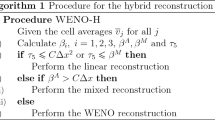Abstract
This paper is concerned with an optimal control problem governed by time-harmonic eddy current equations on a Lipschitz polyhedral domain. The controls are given by scalar functions entering in the coefficients of the curl-curl differential operator in the state equation. We present a mathematical analysis of the optimal control problem, including sensitivity analysis, regularity results, existence of an optimal control, and optimality conditions. Based on these results, we study the finite element analysis of the optimal control problem. Here, the state is discretized by the lowest order edge elements of Nédélec’s first family, and the control is discretized by continuous piecewise linear elements. Our main findings are convergence results of the finite element discretization (without a rate).
Similar content being viewed by others
References
Albanese, R., Monk, P.: The inverse source problem for Maxwell’s equations. Inverse Probl. 22, 1023–1035 (2006)
Alonso, A., Valli, A.: An optimal domain decomposition preconditioner for low-frequency time-harmonic Maxwell equations. Math. Comput. 68, 607–631 (1999)
Alonso, A., Valli, A.: Eddy Current Approximation of Maxwell Equations: Theory, Algorithms and Applications. Springer, New York (2010)
Ammari, H., Buffa, A., Nédélec, J.-C.: A justification of eddy currents model for the Maxwell equations. SIAM J. Appl. Math. 60, 1805–1823 (2000)
Beck, R., Hiptmair, R., Hoppe, R.H.W., Wohlmuth, B.: Residual based a posteriori error estimators for eddy current computation. Modél. Math. Anal. Numér. 34, 159–182 (2000)
Bossavit, A.: Computational Electromagnetism. Academic Press, San Diego (1998)
Chen, Z., Du, Q., Zou, J.: Finite element methods with matching and nonmatching meshes for Maxwell equations with discontinuous coefficients. SIAM J. Numer. Anal. 37, 1542–1570 (2000)
Ciarlet, P. Jr., Zou, J.: Fully discrete finite element approaches for time-dependent Maxwell’s equations. Numer. Math. 82, 193–219 (1999)
Colton, D., Kress, R.: Inverse Acoustic and Electromagnetic Scattering Theory. Springer, Berlin (1998)
Costabel, M., Dauge, M., Nicaise, S.: Singularities of Maxwell interface problems. Modél. Math. Anal. Numér. 33, 627–649 (1999)
Costabel, M., Dauge, M., Nicaise, S.: Singularities of eddy current problems. Modél. Math. Anal. Numér. 37, 807–831 (2003)
Hiptmair, R.: Multigrid method for Maxwell’s equations. SIAM J. Numer. Anal. 36, 204–225 (1998)
Hiptmair, R.: Finite elements in computational electromagnetism. Acta Numer. 11, 237–339 (2002)
Hoppe, R.H.W.: Adaptive multigrid and domain decomposition methods in the computation of electromagnetic fields. J. Comput. Appl. Math. 168, 245–254 (2004)
Hoppe, R.H.W., Schöberl, J.: Convergence of adaptive edge element methods for the 3D eddy currents equations. J. Comput. Math. 27, 657–676 (2009)
Monk, P.: Analysis of a finite element method for Maxwell’s equations. SIAM J. Numer. Anal. 29, 714–729 (1992)
Monk, P.: Finite Element Methods for Maxwell’s Equations. Clarendon, Oxford (2003)
Nédélec, J.-C.: Mixed finite elements in ℝ3. Numer. Math. 35, 315–341 (1980)
Nédélec, J.-C.: A new family of mixed finite elements in ℝ3. Numer. Math. 50, 57–81 (1986)
Nédélec, J.-C.: Acoustic and Electromagnetic Equations. Springer, New York (2001)
Neittaanmäki, P., Picard, R.: Error estimates for the finite element approximation to a Maxwell-type boundary value problem. Numer. Funct. Anal. Optim. 2, 267–285 (1980)
Neittaanmäki, P., Rudnicki, M., Savini, A.: Inverse Problems and Optimal Design in Electricity and Magnetism. Oxford University Press, Oxford (1996)
Romanov, V.G., Kabanikhin, S.I.: Inverse Problems for Maxwell’s Equations. VSP International Science Publishers, Utrecht (1994)
Banks, H.T., Kunisch, K.: Estimation Techniques for Distributed Parameter Systems. Birkhäuser Boston, Cambridge (1989)
Chen, Z., Zou, J.: An augmented Lagrangian method for identifying discontinuous parameters in elliptic systems. SIAM J. Control Optim. 37, 892–910 (1999)
Falk, R.S.: Error estimates for the numerical identification of a variable coefficient. Math. Comput. 40, 537–546 (1983)
Ito, K., Kunisch, K.: The augmented Lagrangian method for parameter estimation in elliptic systems. SIAM J. Control Optim. 28, 113–136 (1990)
Ito, K., Kunisch, K.: Lagrange Multiplier Approach to Variational Problems and Applications. SIAM, Philadelphia (2008)
Rannacher, R., Vexler, B.: A priori error estimates for the finite element discretization of elliptic parameter identification problems with pointwise measurements. SIAM J. Control Optim. 44, 1844–1863 (2005)
Casas, E.: Optimal control in coefficients of elliptic equations with state constraints. Appl. Math. Optim. 26, 21–37 (1992)
Druet, P.-E., Klein, O., Sprekels, J., Tröltzsch, F., Yousept, I.: Optimal control of three-dimensional state-constrained induction heating problems with nonlocal radiation effects. SIAM J. Control Optim. 49, 1707–1736 (2011)
Tröltzsch, F., Yousept, I.: PDE-constrained optimization of time-dependent 3D electromagnetic induction heating by alternating voltages. ESAIM: Math. Model. Numer. Anal. 46, 709–729 (2012)
Yousept, I.: Optimal control of a nonlinear coupled electromagnetic induction heating system with pointwise state constraints. Ann. Acad. Romanian Sci. Ser. Math. Appl. 2, 45–77 (2010)
Yousept, I.: Optimal control of Maxwell’s equations with regularized state constraints. Comput. Optim. Appl. (2011). doi:10.1007/s10589-011-9422-2
Kolmbauer, M., Langer, U.: A robust preconditioned-MinRes-solver for distributed time-periodic eddy current optimal control problems. DK-report No. 2011-07, JKU, Linz (2011)
Wellander, N., Kristensson, G.: Homogenization of the Maxwell equations at fixed frequency. SIAM J. Appl. Math. 64, 170–195 (2003)
Adams, R.A.: Sobolev Spaces. Academic Press, Boston (1978)
Amrouche, C., Bernardi, C., Dauge, M., Girault, V.: Vector potentials in three-dimensional non-smooth domains. Math. Methods Appl. Sci. 21, 823–864 (1998)
Tröltzsch, F.: Optimal Control of Partial Differential Equations. Am. Math. Soc., Providence (2010)
Carstensen, C.: Quasi-interpolation and a posteriori error analysis in finite element method. Modél. Math. Anal. Numér. 33, 1187–1202 (1999)
De Los Reyes, J.C., Meyer, C., Vexler, B.: Finite element error analysis for state-constrained optimal control of the stokes equations. Control Cybern. 37, 251–284 (2008)
Author information
Authors and Affiliations
Corresponding author
Additional information
Communicated by Boris Vexler.
Rights and permissions
About this article
Cite this article
Yousept, I. Finite Element Analysis of an Optimal Control Problem in the Coefficients of Time-Harmonic Eddy Current Equations. J Optim Theory Appl 154, 879–903 (2012). https://doi.org/10.1007/s10957-012-0040-7
Received:
Accepted:
Published:
Issue Date:
DOI: https://doi.org/10.1007/s10957-012-0040-7




